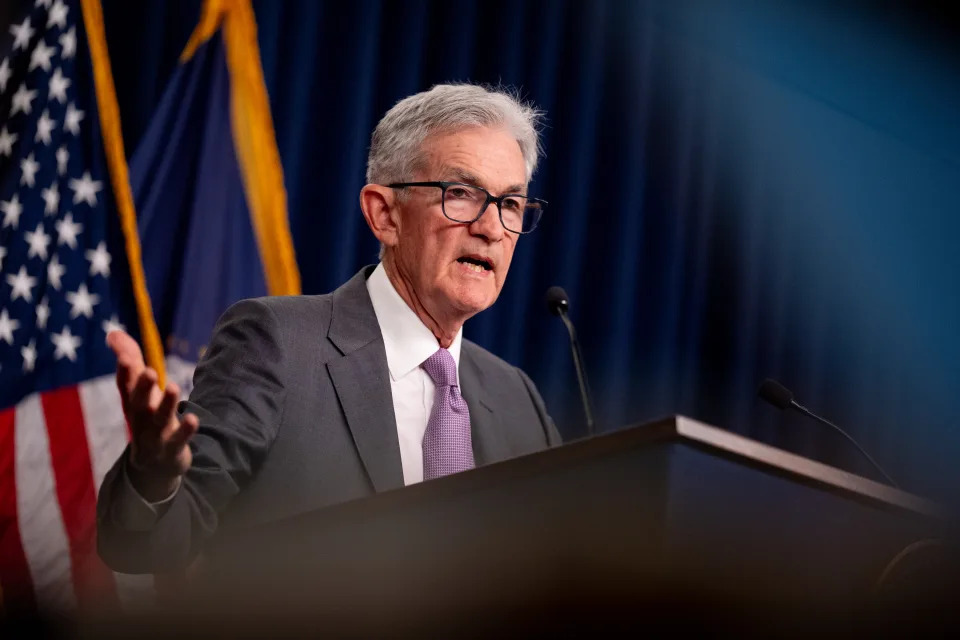The market's response to the weak July jobs report has fueled concerns the Federal Reserve made a mistake holding rates at a 23-year high at their most recent meeting.
And now, talk in some corners of the investment world has shifted from the timing of rate cuts to the timing of a recession hitting the US economy .
But several economists and equity strategists believe that while the risks of recession have risen amid weakening economic data , the last few days of market action have been an overreaction.
In an interview on Tuesday, Apollo Global Management chief economist Torsten Sløk told Yahoo Finance the market is "pricing in too many cuts." (Disclosure: Yahoo Finance is owned by Apollo Global Management.)
Investors quickly moved to price in more than four interest rate cuts in 2024 after Friday's jobs report, up from the three seen after the Fed's meeting on July 31. Some market commentators have even suggested the Fed should cut before its September meeting.
Sløk added that, given the volatile swings seen in market bets on Fed cuts over the past several trading sessions, investors should be taking what the market is projecting with a "grain of salt."
Sløk pointed to data showing consumers still spending on activities like flights , dining out , and hotel stays to make the case that the consumer is showing few signs of pulling back at this point.
"Across the board, there is just not much evidence of the economy either being in a recession or being on its road to entering a recession," Sløk said.
A different composition
The most troubling part of July's jobs report was a rise in the unemployment rate to 4.3%, which triggered a closely followed recession indicator . The report also showed monthly job gains slowed to their second-lowest level since 2020.
But to Deutsche Bank senior US economist Brett Ryan, the report still tells the same story of a labor market "being propped up by lack of layoffs as opposed to strong hiring."
"The composition of the rise in unemployment is sort of different than what you would normally see at the beginning of recession," Ryan said.
The unemployment rate has largely risen due to an increase in the labor supply — people either entering the labor force for the first time or just coming back to work — rather than a rise in permanent layoffs, Ryan argued.
"You don't want to overreact to one data point," Ryan said. "So without question, the risks have risen, leaning toward the Fed starting off with a more aggressive pace of rate cuts, but we're not there yet."
For instance, weekly jobless claims recently hit their highest weekly mark in nearly a year . But Ryan points out that if you remove Texas, where flooding from Hurricane Beryl displaced workers , the four-week average of initial jobless claims is actually dropping.
Bank of America US economist Michael Gapen took a similar stance, writing in a client note that without widespread layoffs, the case for a large emergency rate cut due to labor market dynamics is weaker than the market is pricing.
"A rate cut in September is now a virtual lock, but we do not think the economy needs aggressive, recession-sized cuts," Gapen wrote in a note to clients on Monday.
'Risk assets can recover'
Some strategists also see the market's sharp reaction to this data as an opportunity to get more aggressive in the stock market.
The BlackRock Investment Institute, led by Jean Boivin, wrote in a note to clients on Monday it thinks recession fears are "overblown."
"We think risk assets can recover as recession fears ease and the rapid unwinding of carry trades stabilizes," BlackRock's team wrote. "We keep our overweight to US equities, driven by the AI mega force, and see the selloff presenting buying opportunities."
Seema Shah, chief global strategist at Principal Asset Management, agrees.
Shah pointed to Tuesday's market rebound in telling Yahoo Finance, "What you're seeing now is a little bit of a reality check that maybe the economy concerns are not as bad as had been expected."
Shah added that the key for investors in this market moment remains whether the macro story has fully changed. For now, she thinks it's more of the same.
"We are expecting the US economy to slow, but we're not expecting recession," Shah said.
"We're expecting the Fed to cut rates, but again, not to have to cut rates aggressively. So, from that perspective actually, the backdrop hasn't really changed for us."

Josh Schafer is a reporter for Yahoo Finance. Follow him on X @_joshschafer .

